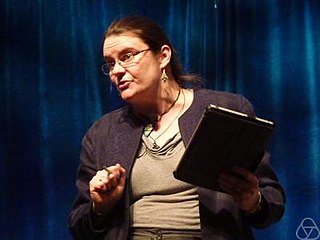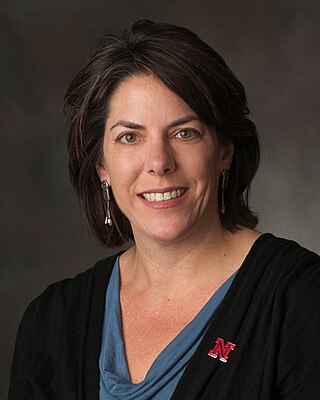Related Research Articles

The Mathematical Association of America (MAA) is a professional society that focuses on mathematics accessible at the undergraduate level. Members include university, college, and high school teachers; graduate and undergraduate students; pure and applied mathematicians; computer scientists; statisticians; and many others in academia, government, business, and industry.

William Gilbert Strang is an American mathematician known for his contributions to finite element theory, the calculus of variations, wavelet analysis and linear algebra. He has made many contributions to mathematics education, including publishing mathematics textbooks. Strang was the MathWorks Professor of Mathematics at the Massachusetts Institute of Technology. He taught Linear Algebra, Computational Science, and Engineering, Learning from Data, and his lectures are freely available through MIT OpenCourseWare.

Paul Joseph Sally, Jr. was a professor of mathematics at the University of Chicago, where he was the director of undergraduate studies for 30 years. His research areas were p-adic analysis and representation theory.
William "Bill" Kent Wootters is an American theoretical physicist, and one of the founders of the field of quantum information theory. In a 1982 joint paper with Wojciech H. Zurek, Wootters proved the no cloning theorem, at the same time as Dennis Dieks, and independently of James L. Park who had formulated the no-cloning theorem in 1970. He is known for his contributions to the theory of quantum entanglement including quantitative measures of it, entanglement-assisted communication and entanglement distillation. The term qubit, denoting the basic unit of quantum information, originated in a conversation between Wootters and Benjamin Schumacher in 1992.
The Deborah and Franklin Tepper Haimo Awards for Distinguished College or University Teaching of Mathematics are awards given by the Mathematical Association of America to recognize college or university teachers "who have been widely recognized as extraordinarily successful and whose teaching effectiveness has been shown to have had influence beyond their own institutions." The Haimo awards are the highest teaching honor bestowed by the MAA. The awards were established in 1993 by Deborah Tepper Haimo and named after Haimo and her husband Franklin Haimo. After the first year of the award up to three awards are given every year.
Judith Victor Grabiner is an American mathematician and historian of mathematics, who is Flora Sanborn Pitzer Professor Emerita of Mathematics at Pitzer College, one of the Claremont Colleges. Her main interest is in mathematics in the eighteenth and nineteenth centuries.

Jennifer J. Quinn is an American mathematician specializing in combinatorics, and professor of mathematics at the University of Washington Tacoma. She sits on the board of governors of the Mathematical Association of America, and is serving as its president for the years 2021 and 2022. From 2004 to 2008 she was co-editor of Math Horizons.
Erica Flapan is an American mathematician, the Lingurn H. Burkhead Professor of Mathematics at Pomona College. She is the aunt of sociologist Heather Schoenfeld
Joan Prince Hutchinson is an American mathematician and Professor Emerita of Mathematics from Macalester College.

Judy Leavitt Walker is an American mathematician. She is the Aaron Douglas Professor of Mathematics at the University of Nebraska–Lincoln, where she chaired the mathematics department from 2012 through 2016 and currently serves as the Associate Vice Chancellor for Faculty Affairs. Her research is in the area of algebraic coding theory.
Suzanne L. Weekes is the Executive Director of the Society for Industrial and Applied Mathematics. She is also Professor of Mathematical Sciences at Worcester Polytechnic Institute (WPI). She is a co-founder of the Mathematical Sciences Research Institute Undergraduate Program.
Deborah Tepper Haimo (1921–2007) was an American mathematician who became president of the Mathematical Association of America (MAA). Her research concerned "classical analysis, in particular, generalizations of the heat equation, special functions, and harmonic analysis".

Annalisa Crannell is an American mathematician, and an expert in the mathematics of water waves, chaos theory, and geometric perspective. She is a professor of mathematics at Franklin & Marshall College.
Olympia E. Nicodemi is a mathematician and mathematics educator whose research interests range from wavelets to the history of mathematics. She was a distinguished teaching professor of mathematics at the State University of New York at Geneseo until 2020, when she retired.
Aparna W. Higgins is a mathematician known for her encouragement of undergraduate mathematicians to participate in mathematical research. Higgins originally specialized in universal algebra, but her more recent research concerns graph theory, including graph pebbling and line graphs. She is a professor of mathematics at the University of Dayton.
Rhonda Lee Hatcher is an American mathematician whose research topics include analytic number theory and L-functions as well as topics in recreational mathematics. She is an emeritus associate professor of mathematics at Texas Christian University.
Pamela Estephania Harris is a Mexican-American mathematician, educator and advocate for immigrants. She is currently an associate professor at the University of Wisconsin-Milwaukee in Milwaukee, Wisconsin, was formerly an associate professor at Williams College in Williamstown, Massachusetts and is co-founder of the online platform Lathisms. She is also an editor of the e-mentoring blog of the American Mathematical Society (AMS).
Donald Steven Passman is an American mathematician, specializing in ring theory, group theory, and Lie algebra theory.

Mark Tomforde is an American mathematician and Professor of Mathematics at University of Colorado Colorado Springs. He works in the areas of functional analysis and algebra, and he earned his Ph.D. in mathematics at Dartmouth College in 2002. Tomforde's research interests are in operator algebras and C*-algebras, and he has made contributions to the study of graph C*-algebras and Leavitt path algebras. He was an invited speaker at the 2015 Abel Symposium, and he is a founding member of the Algebras and Rings in Colorado Springs (ARCS) center. He has also received several awards for his teaching and outreach efforts.
Lisa Mantini is an American mathematician.
References
- ↑ Birth year from WorldCat identities, retrieved 2019-01-13.
- ↑ Faculty listing, Williams College, retrieved 2014-12-25.
- 1 2 3 4 5 Susan Loepp Wins National Award for Excellence in Teaching Mathematics, Williams College, January 27, 2012, retrieved 2014-12-25.
- 1 2 3 Susan Loepp, The National Alliance for Doctoral Studies in the Mathematical Sciences, retrieved 2014-12-25.
- ↑ Susan Renee Loepp at the Mathematics Genealogy Project
- ↑ Review of Protecting Information by Fan Junjie (March 29, 2012), International Association for Cryptologic Research.
- ↑ Review of Protecting Information by Darren Glass (April 5, 2007), MAA Reviews, Mathematical Association of America.
- ↑ "Previous Recipients | Bethel College". www.bethelks.edu. Retrieved 2020-01-17.
- ↑ "Awards -- Northeastern Section of the MAA". sections.maa.org. Retrieved 2020-01-17.
- ↑ Deborah and Franklin Tepper Haimo Award - List of Recipients, MAA, retrieved 2014-12-25.
- ↑ List of Fellows of the American Mathematical Society, retrieved 2014-12-25.
- ↑ "AMS Committees". American Mathematical Society. Retrieved 2023-03-29.